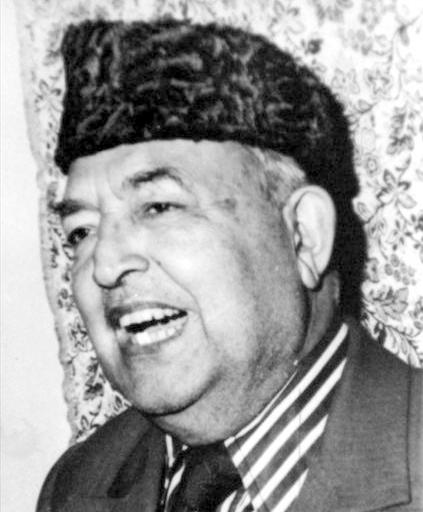Early Life
Mirza Mohammed Afzal Beg was born in the Kashmir Valley’s Sarnel village (District Anantnag) in February 1908. He completed his schooling from C.M.S High School, Anantnag and graduated from Sri Pratap College, Srinagar. He then left Kashmir to pursue law at Aligarh Muslim University (AMU) — he belonged to the early crop of Kashmiri Muslims who gained access to higher education.
Role in India’s Independence Movement
By 1932, he had returned to Kashmir and was joined by other young Kashmiri graduates like Sheikh Abdullah and G.M. Sadiq to protest the anti-democratic rule of the Maharaja of Jammu and Kashmir and demand self-government for Kashmiris. He formally joined Abdullah’s Jammu and Kashmir Muslim Conference (‘Conference’) and rose through the ranks to become its General Secretary. Beg and Abdullah would go on to enjoy a close political and personal relationship.
In 1934, in the face of increasing protests, the Maharaja agreed to set up a Kashmir Legislative Assembly. Beg was elected to this Assembly. Meanwhile, the Conference was beginning to undergo something of an identity crisis that culminated in the setting up of a new political party – the National Conference. This new Party aimed to shift its focus from matters of Islamic religious belief to social and political issues.
In the early 1940s, there was some collaboration between the Maharaja and the National Conference in Kashmir’s governance. Beg was appointed to a Royal Commission that made recommendations to the Maharaja on Kashmir’s political future. A key recommendation was dyarchy — political power should be shared between the Maharaja and the Legislative Assembly.
In what appeared to be a dyarchy inspired appointment, the Maharaja brought two Assembly members into his Cabinet. Beg was one of them. From 1944 to 1946, he served as a Minister for Public Works and Municipalities.
In 1946, Beg resigned from the Cabinet as he felt that the Maharaja’s attempts at implementing dyarchy was a farce. This created a huge uproar in Kashmir and marked the beginning of fierce conflict with the Maharaja. The Maharaja imprisoned Beg for participating in the 1946 Quit Kashmir Movement aimed at shunting out Kashmir’s royal family for good.
Contribution to Constitution Making
Beg was one of four members elected to the Constituent Assembly from Jammu and Kashmir. He was not an active member of the Assembly. He was also part of the Jammu and Kashmir Constituent Assembly that drafted the Constitution between 1951 and 1956.
Later Contributions
In 1947, the Maharaja acceded to the Indian dominion. An emergency administration, led by Abdullah, was installed. In 1948, Beg was appointed as the cabinet minister for Revenue, Food and Rehabilitation. During his tenure, Beg initiated and oversaw large scale land reforms in Jammu and Kashmir bringing an end to the feudal system.
The years between 1951 and 1956 were politically charged for Beg. He was a member of the Jammu and Kashmir Constituent Assembly that drafted the State’s Constitution. However, this second innings as a constitution framer was intermittent. In 1953, a coup mounted by a group of National Conference members lead by Bakshi Ghulam Mohammad, displaced Sheikh Abdullah as the Prime Minister of Jammu and Kashmir. In the years that followed, Beg and other National Conference members were repeatedly arrested by the new government. He was released from prison for good in 1956, and along with Sheikh Abdullah, formed a new political party called Plebiscite Front.
In 1975, Abdullah and the Indira Gandhi government were in negotiations over the question of Kashmir’s autonomy. These negotiations in which Beg played a key role resulted in the 1975 Indira-Sheikh Accord that returned Abdullah as the State’s Chief Minister.
In 1978, while serving as the Deputy Chief Minister in Abdullah’s cabinet, Abdullah asked Beg to resign alleging that Beg was responsible for defections in the Party.
After a prolonged illness, Beg passed away on 11 June 1982.
Key Writings
Some of Beg’s writings include, The Farce of Dyarchy and On the Way to Golden Harvests: Agricultural Reforms in Kashmir (1951).
- Who’s Who 1950 (Parliament of India)
- Personalities: A Comprehensive and Authentic Biographical Dictionary of Men who Matter in India (Arunam and Sheel, 1950)
- Remembering Mirza Afzal Beg (Greater Kashmir, 2015)
- Tribute: Mirza Afzal Beg by Mohammad Sayeed Malik (Kashmir Times, 2013)

